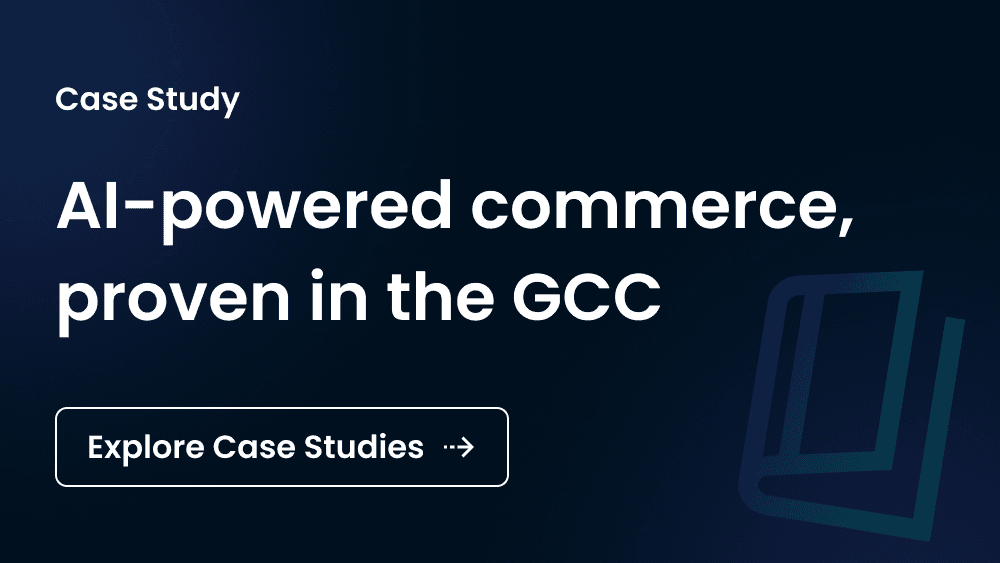Why Choose Cloud Over Self-Hosted Solutions for Enterprise E-Commerce Development?
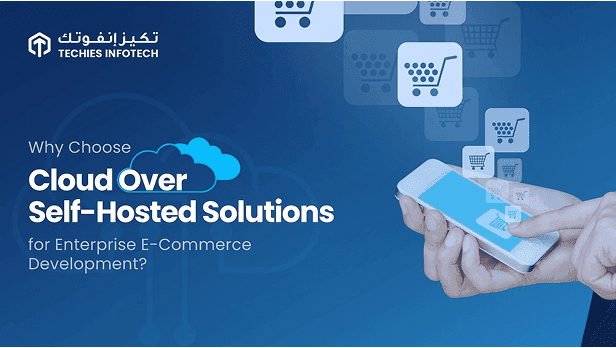
Did you know that the global e-commerce market is projected to reach an astonishing $7.5 trillion by 2025, with businesses increasingly turning to cloud computing to fuel this growth? In fact, over 94% of enterprises already leverage cloud services to enhance scalability, efficiency, and customer experience.
In the world of enterprise e-commerce, the choice between cloud computing and self-hosted solutions can be pivotal. While self-hosted solutions offer complete control over your infrastructure, they have substantial maintenance, upgrades, and security responsibilities. On the other hand, cloud computing provides a flexible, scalable, and cost-effective alternative, enabling businesses to focus on innovation rather than infrastructure.
This blog explores why cloud solutions are increasingly becoming the preferred choice for enterprise e-commerce development. From seamless scalability to cutting-edge security, we’ll explore the benefits that make the cloud a game-changer in today’s competitive digital landscape.
The Challenges of Self-Hosted E-Commerce
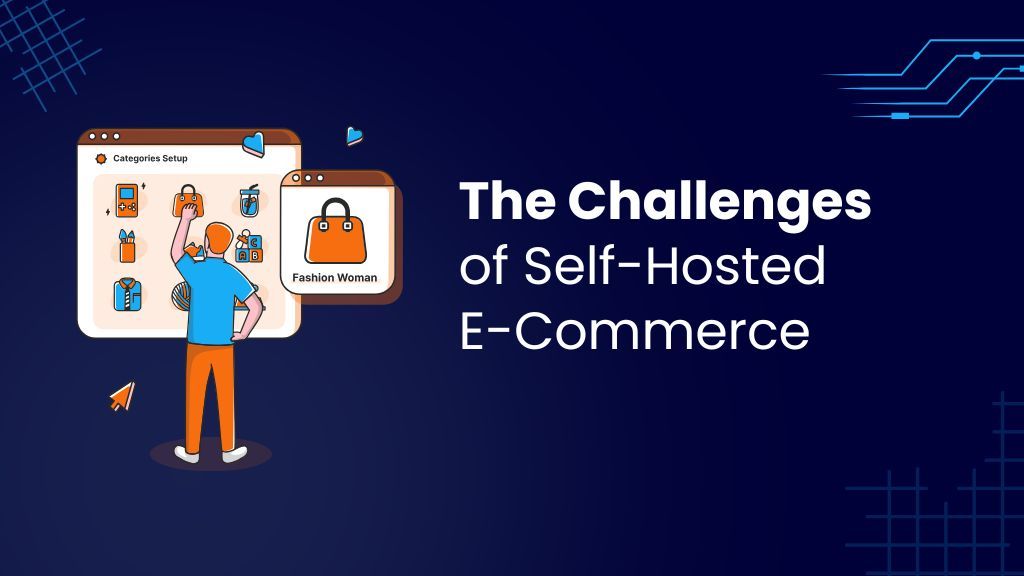
While self-hosted e-commerce solutions offer full control over your infrastructure, they come with a hefty price tag—not just in monetary terms but also in time, effort, and flexibility. Let’s dive into some of the most significant challenges businesses face when opting for self-hosted e-commerce platforms.
1. High Upfront Costs
One of the most immediate hurdles of self-hosted e-commerce is the substantial capital investment required to get started. Businesses must allocate significant funds for:
- Hardware: Servers, storage devices, and networking equipment.
- Software Licenses: Operating systems, e-commerce platforms, and other necessary applications.
- Data Center Space: Renting or building a data center or opting for colocation services.
- Setup Costs: Initial configuration, integration, and testing of the infrastructure.
2. Ongoing Maintenance and Management
Once the system is up and running, the operational demands begin. A self-hosted solution requires dedicated IT staff to handle the following:
- Hardware Maintenance: Replacing failing components and ensuring system uptime.
- Software Updates: Regular updates to e-commerce platforms, operating systems, and associated software.
- Security Patching: Vigilantly applying patches to protect against vulnerabilities.
- System Monitoring: Constantly checking for performance bottlenecks, outages, or potential threats.
3. Scalability Limitations
Scaling a self-hosted e-commerce platform to meet traffic demands is complex and time-consuming. Businesses face two primary challenges:
- Under-Provisioning: Insufficient resources can lead to slow load times, cart abandonment, and lost revenue during traffic spikes.
- Over-Provisioning: Allocating too many resources leads to wasted capacity and increased costs when traffic doesn’t meet expectations.
Unlike cloud solutions, which can dynamically scale resources up or down, self-hosted platforms often require manual adjustments, additional hardware purchases, and significant planning, making them unsuitable in fast-moving markets.
4. Security Vulnerabilities
In a self-hosted environment, the responsibility for security lies entirely with the business. This includes:
- Setting up and maintaining firewalls and intrusion detection systems.
- Ensuring data encryption for sensitive customer information.
- Regularly auditing systems for vulnerabilities.
Human error—whether a missed update, a misconfigured server, or lax access controls—can exacerbate risks. A security breach, which can have devastating repercussions ranging from reputational damage to financial penalties, can be especially devastating for enterprises handling high volumes of transactions.
5. Lack of Agility
Self-hosted solutions can severely hinder a business’s ability to innovate and adapt. Challenges include:
- Long Development Cycles: Deploying new features or updates often requires extensive testing and infrastructure adjustments.
- Slow Response to Market Changes: Rolling out changes to meet customer expectations or capitalize on trends becomes cumbersome.
- Rigid Infrastructure: Scaling down or repurposing resources can be as difficult as scaling up.
The Advantages of Cloud-Based E-Commerce
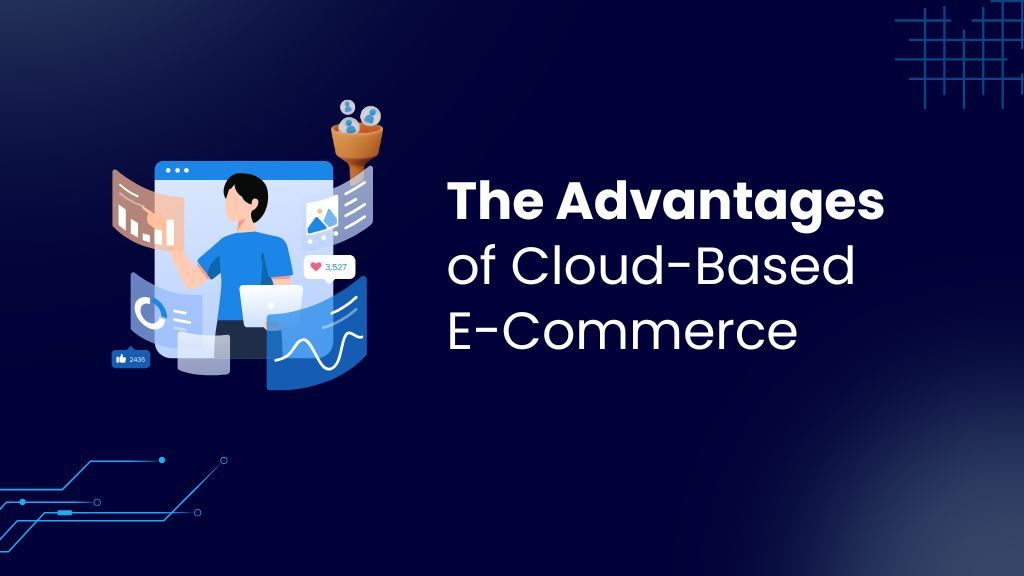
In today’s fast-paced digital landscape, cloud-based e-commerce solutions are becoming the gold standard for businesses aiming to stay competitive and agile. Let’s explore the key advantages that make cloud platforms an ideal choice for enterprise e-commerce development.
1. Scalability and Flexibility
One of the most significant benefits of cloud-based e-commerce is its on-demand scalability, allowing businesses to:
- Handle Traffic Fluctuations: Cloud platforms dynamically adjust resources to maintain optimal performance without downtime, whether it’s a sudden surge during a holiday sale or a lull in the off-season.
- Optimize Costs: Instead of over-provisioning resources to prepare for peak demand, businesses can scale up or down in real time, ensuring that they only pay for what they use.
2. Cost-Effectiveness
Cloud solutions operate on a pay-as-you-go pricing model, making them far more cost-effective than self-hosted alternatives. Key advantages include:
- No Large Upfront Investments: Eliminates the need to purchase expensive hardware or secure a data center.
- Reduced Operational Expenses: Businesses save on IT staff, hardware maintenance, power, and cooling costs.
- Predictable Budgeting: The transparent billing model allows enterprises to forecast expenses accurately and avoid unexpected costs.
3. Enhanced Security
Cloud providers invest heavily in state-of-the-art security measures, offering a level of protection often difficult for individual businesses to achieve. Features include:
- Data Encryption: Ensuring sensitive customer information is secure in transit and at rest.
- Threat Detection and Mitigation: Advanced monitoring systems identify and address vulnerabilities proactively.
- Physical Security: Secure data centers with 24/7 surveillance and strict access controls.
- Compliance Certifications: Industry standards like PCI DSS, ISO 27001, and GDPR compliance ensure adherence to best practices.
4. Increased Reliability and Availability
Cloud platforms are designed to deliver high levels of reliability, ensuring uninterrupted service for e-commerce businesses. Key benefits include:
- Redundant Infrastructure: Data is replicated across multiple servers and locations, reducing the risk of downtime.
- Disaster Recovery Mechanisms: Built-in recovery solutions ensure quick restoration of services in case of outages.
- Geographically Distributed Data Centers: Ensures low latency and seamless experiences for users worldwide.
- Uptime Guarantees: Service level agreements (SLAs) often promise 99.9% or higher availability, minimizing the risk of lost sales due to downtime.
These capabilities translate into better customer satisfaction and enhanced trust in your brand.
5. Faster Time to Market and Innovation
Cloud platforms empower businesses with tools to stay ahead of the competition by:
- Access to Cutting-Edge Technologies: Leverage features like AI/ML-powered analytics, serverless computing, and advanced databases to innovate and optimize operations.
- Rapid Deployment: Deploy new features, updates, and integrations quickly without waiting for infrastructure adjustments.
- Streamlined Development Cycles: Use pre-built tools and frameworks to accelerate time-to-market, keeping your business agile and responsive to customer needs.
6. Global Reach
Cloud platforms enable businesses to reach customers worldwide without geographical limitations:
- Low Latency for Global Users: Data centers strategically placed worldwide ensure fast load times for customers, no matter where they are.
- Localized Services: Easily adapt your platform to regional markets with features like multi-currency support, language options, and compliance with local regulations.
- Seamless Expansion: Scale operations to new regions without investing in local infrastructure.
Addressing Common Concerns About Cloud
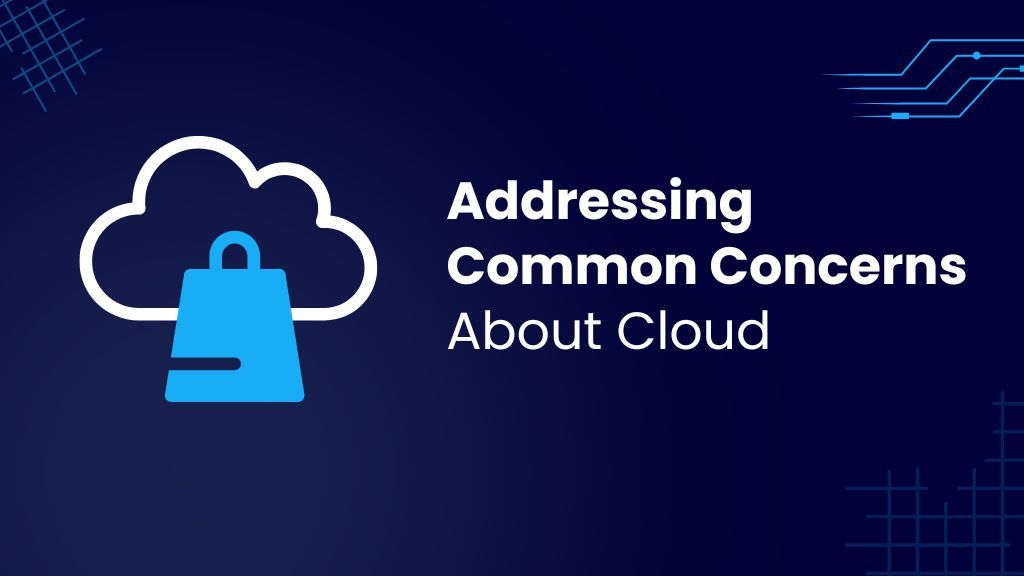
Despite the undeniable benefits of cloud computing, some businesses are hesitant to switch due to common concerns about security, vendor lock-in, and internet dependency. Let’s explore these worries and discuss how they can be addressed effectively.
1. Data Security and Privacy
One of the top concerns about cloud adoption is the security of sensitive business and customer data. However, cloud providers implement robust measures to ensure data security and privacy that often surpass on-premise capabilities.
- Advanced Data Encryption: Cloud providers use encryption to protect data both in transit and at rest, ensuring that the data remains unreadable even if intercepted.
- Strict Access Controls: Multi-factor authentication, role-based access, and zero-trust security models limit access to sensitive information.
- Continuous Monitoring: Proactive threat detection systems and regular audits help identify and mitigate vulnerabilities before they become issues.
- Compliance Certifications: Major providers comply with industry standards like ISO 27001, PCI DSS, GDPR, and HIPAA, ensuring adherence to stringent security and privacy regulations.
2. Vendor Lock-In
Vendor lock-in occurs when businesses become overly dependent on a single cloud provider, making migration or integration with other platforms difficult. While this is a valid concern, there are effective strategies to mitigate the risk:
- Use Open Standards: To ensure flexibility and compatibility with other providers, opt for platforms that support open APIs, standards, and interoperable services.
- Adopt a Multi-Cloud Strategy: Diversify your reliance by using multiple cloud providers for different services. This approach minimizes dependency on a single vendor and offers access to each platform’s best features.
- Maintain Data Portability: Regularly export and back up critical data in formats that are easy to migrate to other platforms, ensuring business continuity if you decide to switch providers.
- Thorough Contract Review: Negotiate favorable contract terms that include provisions for smooth transitions, such as clear exit strategies and data migration support.
3. Internet Dependency
Cloud platforms rely on internet connectivity, which raises concerns about service interruptions due to outages. However, these risks are largely mitigated by the high availability and redundancy offered by cloud providers:
- Redundant Network Connections: Cloud providers maintain multiple internet pathways and failover mechanisms to ensure uninterrupted service even if one connection fails.
- Global Infrastructure: With data centers distributed across the globe, traffic can be rerouted to maintain service availability during localized outages.
- Offline Access Options: Many cloud applications offer offline capabilities, allowing critical operations to continue without internet access.
- Enhanced Connectivity Options: Businesses can establish dedicated network connections (e.g., AWS Direct Connect, Azure ExpressRoute) for more reliable performance and reduced latency.
Choosing the Right Cloud Provider
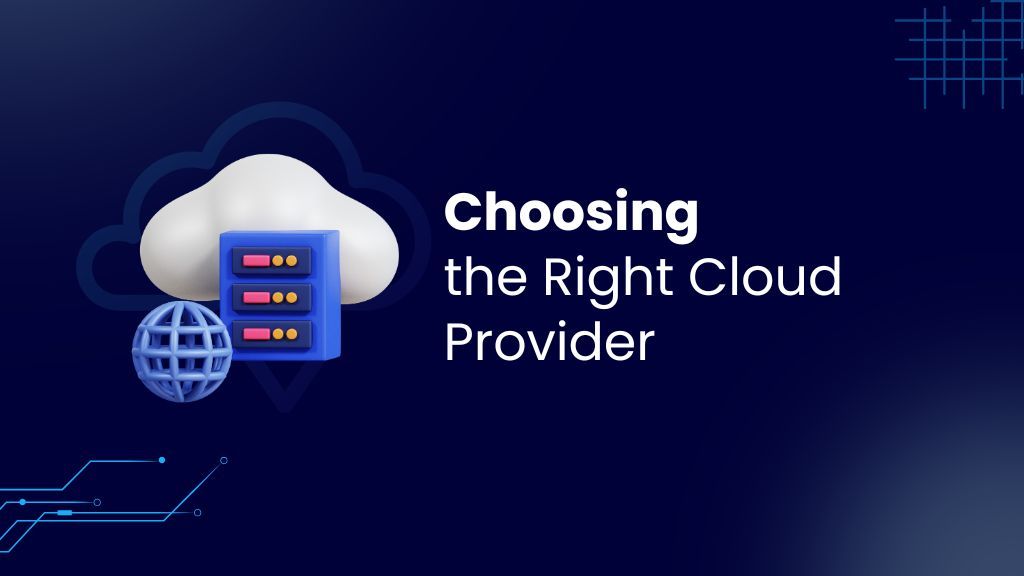
The success of your cloud-based e-commerce strategy depends significantly on selecting the right cloud provider. With several major players dominating the market, understanding their strengths and aligning them with your business needs is essential. Let’s explore the leading providers and offer tips for making the best choice.
Major Cloud Providers and Their Strengths
1. Amazon Web Services (AWS)
- Market Leader: AWS is the largest cloud provider, offering the most extensive range of services.
- Strengths:
- Exceptional scalability and global reach with a vast network of data centers.
- Industry-leading e-commerce features include AI/ML services, serverless computing, and managed databases.
- Proven reliability with high uptime guarantees.
- Best For: Businesses seeking a comprehensive, scalable solution with a strong emphasis on innovation.
2. Microsoft Azure
- Seamless Integration: Ideal for enterprises already using Microsoft products like Office 365 or Dynamics.
- Strengths:
- Strong hybrid cloud capabilities for businesses transitioning from on-premise to cloud.
- Advanced AI and analytics tools make it a favorite among data-driven organizations.
- Robust security and compliance offerings, especially for regulated industries like healthcare and finance.
- Best For: Businesses requiring hybrid solutions or deep integration with Microsoft’s ecosystem.
3. Google Cloud Platform (GCP)
- Data and AI Expertise: GCP excels in data analytics, machine learning, and Big Data.
- Strengths:
- High-performance computing capabilities and advanced ecommerce website developer tools.
- Focus on open-source technology, allowing flexibility and interoperability.
- Competitive pricing, especially for startups and businesses emphasizing AI-driven growth.
- Best For: Organizations prioritizing data science, AI/ML capabilities, and cost-efficiency.
How to Choose the Right Cloud Provider
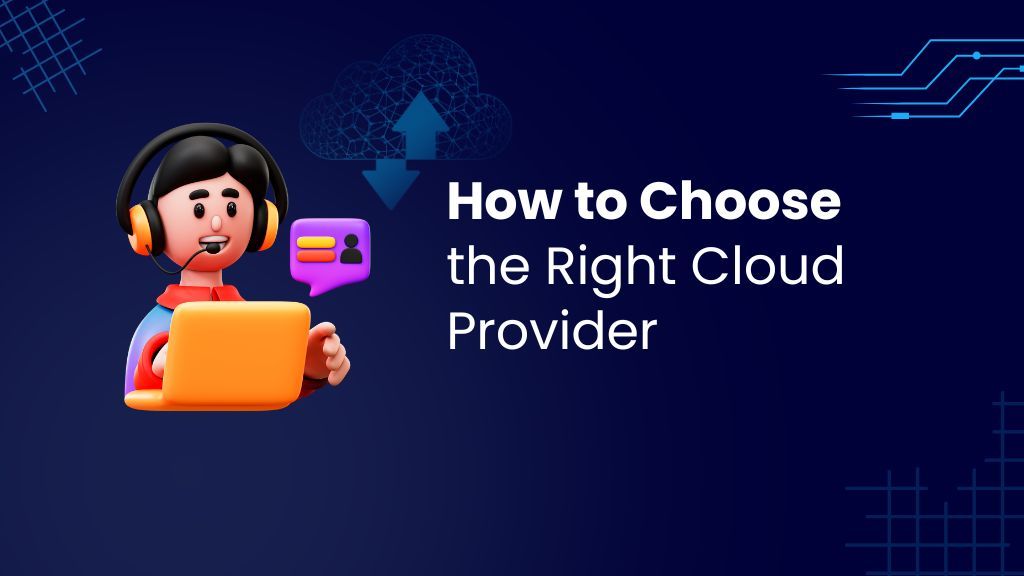
1. Understand Your Business Needs
Start by evaluating your current and future requirements:
- Scalability: Does your business experience seasonal traffic spikes or unpredictable growth? AWS is a strong contender for businesses with high scalability demands.
- Integration: Azure’s seamless integration could streamline your operations if you rely heavily on Microsoft products.
- Data-Intensive Applications: GCP provides unparalleled tools and support for businesses leveraging AI or Big Data.
2. Set a Realistic Budget
- Compare pricing models, including pay-as-you-go, reserved instances, and free-tier offerings.
- Consider the total cost of ownership, including hidden costs for support, data transfer, and add-on services.
3. Evaluate Performance and Reliability
- Look for providers with global infrastructure to ensure low latency and high availability for your customers.
- Review uptime guarantees and SLAs to understand the level of reliability you can expect.
4. Assess Security and Compliance
- Ensure the provider meets your industry’s compliance standards, such as GDPR, HIPAA, or PCI DSS.
- Look for advanced security features like data encryption, threat detection, and disaster recovery.
5. Test Compatibility and Flexibility
- Opt for providers that support open standards and APIs to minimize vendor lock-in.
- Consider hybrid or multi-cloud strategies if you want flexibility across platforms.
Conclusion
By leveraging the cloud’s on-demand scalability, businesses can effortlessly handle traffic spikes, ensuring a seamless shopping experience for customers. The pay-as-you-go model eliminates hefty upfront costs, allowing you to invest in growth rather than infrastructure. With state-of-the-art security measures and global compliance certifications, cloud providers ensure that your data remains safe and your business stays protected.
Now is the time to future-proof your e-commerce strategy. So, are you ready to elevate your e-commerce business? Then, find the best ecommerce development company. You can visit us for excellent ecommerce web development services.
Tech insights and expert perspectives on thefuture of technology and eCommerce
Tech insights and expert perspectives on the future of technology and eCommerce
Let's Connect

